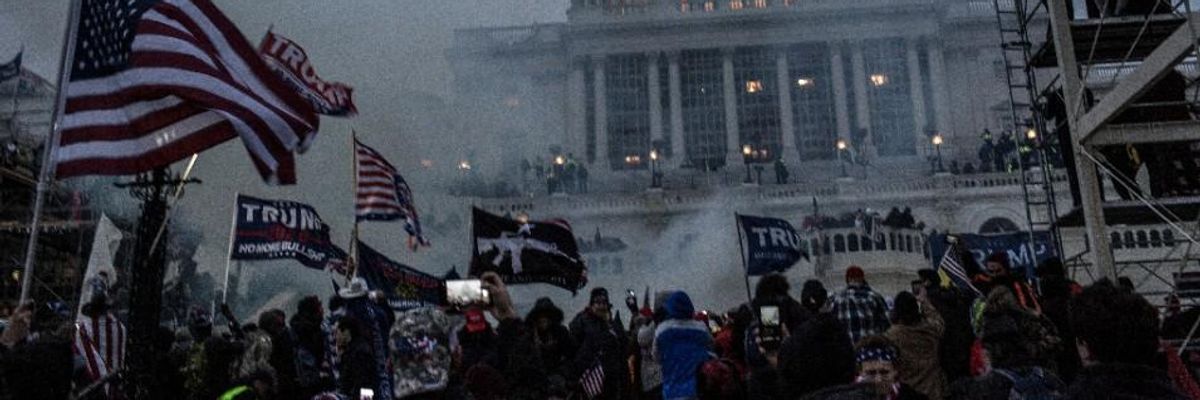This morning at 9:00 am, an "Open Letter in Defense of Democracy" was published, simultaneously, by The New Republic and The Bulwark (see here and here).
The letter was co-signed by around 40 public intellectuals across the political spectrum, from Noam Chomsky and Adolph Reed to prominent former-neoconservatives Max Boot and Mona Charen.
It was drafted by me along with two collaborators: Todd Gitlin and William Kristol.
A few years ago I am pretty sure that neither Todd nor I ever imagined collaborating with Bill, just as I am pretty confident Bill never imagined collaborating with either of us. Indeed, a couple of years ago I locked horns with Bill at a New School conference.
We have come together precisely because we regard these differences as important, and we believe that if the forces of Know Nothingism, racism, and reaction associated with Trumpism prevail, we will all suffer.
And yet the threat to liberal democracy has never been greater in our lifetime. Each of us has been sounding the alarm in our own way for some time. And as the situation darkened, some e-mail exchanges became a one-off conversation which became a regular Zoom meeting which eventually became a collaboration and a friendship.
The Open Letter is one outcome of this friendly collaboration, an effort for us to reach beyond our normal comfort zones, and to see if we could bring together a range of friends and collaborators from left to right in support of a general statement about the importance of democracy. The statement locates Trumpism and the Republican Party as twin dangers to U.S. democracy, and it calls for serious voting rights legislation and a broader effort to defeat these twin dangers.
From its opening words, the Letter enacts a kind of "common front" among people who disagree about much but who are steadfastly committed to liberal democracy as the best and most legitimate political arrangement for expressing and acting on disagreement. Some of our signatories have long been aligned with the anti-war movement and with the Sanders wing of the Democratic party. Some have been aligned with the more centrist Obama-Clinton-Biden wing. Some were supporters of John McCain or Mitt Romney, and some--most notably Bill Kristol--were supporters of George W. Bush and of Ronald Reagan before him. (It's a pretty diverse list. Check it out.)
And yet we have come together behind the Letter, which has a pretty clear political message. And we have brought together two very different journals, the New Republic and The Bulwark, behind this effort--and it is virtually unprecedented to see such a collaboration between journals such as these. We have not checked our differences at the door. And yet we have come together precisely because we regard these differences as important, and we believe that if the forces of Know Nothingism, racism, and reaction associated with Trumpism prevail, we will all suffer. Our political differences are real. And our joint commitment to democracy is grounded in those very differences.
Many who will read this will be angry about what some of our signatories have said or done in the past. This is understandable. And I hope that it will not get in the way of seeing that the current battle over democracy is very real, the stakes are very high, and some of those with whom you have strongly disagreed in the past are now allies in this struggle.
Many who will read this will believe that it is impossible to talk about democracy without talking about the global climate crisis or the inequalities of global capitalism or the scourge of racism. This is understandable, and I share these concerns. And at the same, I know that there are others to my right--as well as to my left--who think about these things differently than I do, and who are nonetheless fellow citizens who are engaged in their own processes of rethinking, and who wish to join now in defense of democracy. Now is not a time to slap away a handshake--and, to be clear, a handshake is not a marriage vow, it is simply but crucially a form of friendship borne of common experience.
The struggle against the injustices of capitalism remains important to many. So too the struggle against environmental degradation and racism and sexism.
And the best way to further these causes is through education, advocacy, social movement organizing, and participation in electoral politics.
And each of these things--education, advocacy, movement organizing, and participation in at least minimally free and fair elections--is now threatened by the Republican onslaught against democracy.
And so my collaborators and I believe it is important to come together with all of those who are willing to join in defense of democracy.
This does not require us to like all of those with whom we join--though we have made some real friendships through this collaboration--nor does it require us to forget about their pasts or our own pasts.
It simply requires us to acknowledge the ethical and political importance of coming together, across differences, to defend the things that we value in common.
Perhaps Benjamin Franklin said it best, at another moment when some very different people came together to oppose the tyranny of their time: "We must, indeed, all hang together or, most assuredly, we shall all hang separately."
